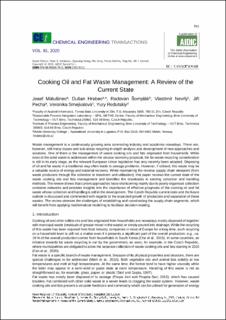| dc.contributor.author | Matušinec, Josef | |
| dc.contributor.author | Hrabec, Dušan | |
| dc.contributor.author | Šomplák, Radovan | |
| dc.contributor.author | Nevrly, Vlastimir | |
| dc.contributor.author | Pecha, Jiří | |
| dc.contributor.author | Smejkalová, Veronika | |
| dc.contributor.author | Redutskiy, Yury | |
| dc.date.accessioned | 2022-11-15T09:52:38Z | |
| dc.date.available | 2022-11-15T09:52:38Z | |
| dc.date.created | 2020-08-28T17:20:16Z | |
| dc.date.issued | 2020 | |
| dc.identifier.citation | Chemical Engineering Transactions. 2020, 81 763-768. | en_US |
| dc.identifier.issn | 1974-9791 | |
| dc.identifier.uri | https://hdl.handle.net/11250/3031854 | |
| dc.description.abstract | Waste management is a continuously growing area connecting industry and academia nowadays. There are, however, still many issues and sub-areas requiring in-depth analysis and development of new approaches and solutions. One of them is the management of waste cooking oils and fats originated from households. While most of the solid waste is addressed within the circular economy proposal, the fat waste recycling consideration is still in its early stage, as the relevant European Union legislation has only recently been adopted. Disposing of oil and fat waste in a traditional way often leads to sewage problems. However, if utilised, this waste may be a valuable source of energy and material recovery. While maintaining the reverse supply chain viewpoint (from waste producers through the collection to treatment and utilisation), this paper reviews the current state of the waste cooking oils and fats management and identifies the drawbacks in existing collection and handling methods. The review shows that current approaches have shortcoming mainly due to poorly organised collection container networks and provides insights into the importance of effective prognosis of the cooking oil and fat waste whose collection and handling is still in the development. The Czech Republic current state and the future outlook is discussed and commented with regards to the expected growth of production and separation of these wastes. The review stresses the challenges of establishing and coordinating the supply chain segments, which will benefit from applying mathematical modelling to facilitate decision-making. | en_US |
| dc.language.iso | eng | en_US |
| dc.relation.uri | https://www.cetjournal.it/index.php/cet/issue/view/vol81 | |
| dc.title | Cooking oil and fat waste management : a review of the current state | en_US |
| dc.type | Peer reviewed | en_US |
| dc.type | Journal article | en_US |
| dc.description.version | publishedVersion | en_US |
| dc.source.pagenumber | 763-768 | en_US |
| dc.source.volume | 81 | en_US |
| dc.source.journal | Chemical Engineering Transactions | en_US |
| dc.identifier.doi | 10.3303/CET2081128 | |
| dc.identifier.cristin | 1825852 | |
| cristin.ispublished | true | |
| cristin.fulltext | original | |
| cristin.qualitycode | 1 | |
